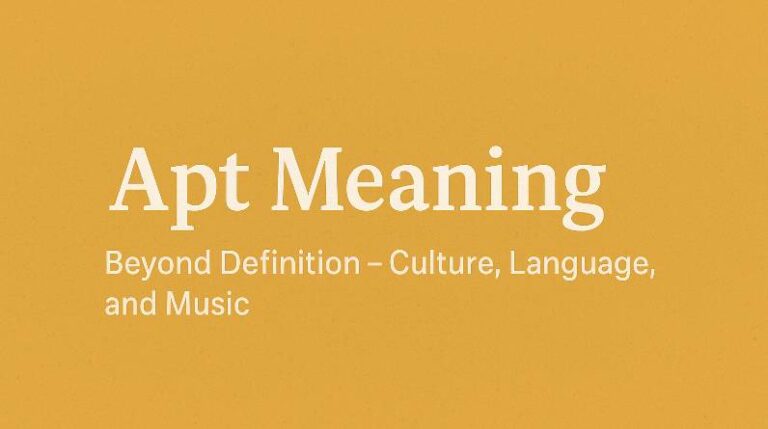When most people think of the word “apt”, they recall its traditional English definitions—fitting, appropriate, or quick to learn. But in 2025, “apt” carries a much broader and culturally rich meaning thanks to recent global musical influence, especially through the hit collaboration between BLACKPINK’s Rosé and Bruno Mars. This article unpacks the word “apt” not just linguistically, but also culturally and socially, exploring how a single syllable bridges language, lifestyle, and global entertainment.
What Does “Apt” Traditionally Mean?
In standard English, “apt” is an adjective and typically means:
| Usage | Meaning | Example |
| Appropriate | Suitable or fitting in context | An apt description of the situation. |
| Likely | Having a tendency to do something | He’s apt to forget birthdays. |
| Intelligent | Quick to learn | An apt pupil in mathematics. |
These meanings are commonly used in literature, conversation, education, and journalism. However, the emergence of “APT.” as a cultural reference redefines its significance for a global audience.
A Fresh Perspective: “APT.” as a Korean Cultural Reference
In the hit 2024 single “APT.” by Rosé and Bruno Mars, the term takes on an entirely new identity. Here, APT. is not an English adjective but a romanized abbreviation of the Korean word “아파트” (apateu), which translates to “apartment” in English.
The Cultural Twist: A Korean Drinking Game
What makes this interesting is that “apateu” is also the name of a lighthearted Korean drinking game, often played in small apartment gatherings—hence the playful double meaning.
“APT. is actually my favorite Korean drinking game that I play with my friends back home. It’s simple, fun, and breaks the ice at any party.”
– Rosé, BLACKPINK (Vogue Interview)
How to Play the APT Drinking Game
The APT game is a social game centered around reflexes, memory, and good humor. It’s especially popular in Korean college culture and among young professionals.
Step-by-Step Instructions:
- Start with the chant:
Everyone chants “apateu, apateu, apateu” in unison. - Stack hands:
Players form a circle and stack one hand on top of another in the center. - Pick a forbidden number:
One player selects a number no one is allowed to say during the round. - Begin counting:
Starting from the bottom hand, each player takes turns calling out the next number aloud (1, 2, 3…), moving their hand to the top of the pile. - Rules and penalties:
- If someone says the forbidden number → they drink.
- If two people speak at once or overlap → both drink.
- Repeat rounds:
The game continues, often escalating into more laughter and errors.
Fun Fact: Despite its simplicity, the game is celebrated for being an effective icebreaker and a symbol of casual friendship.
“APT.” in Pop Music: A New Layer of Meaning
In Rosé and Bruno Mars’ song, “APT.” isn’t just about a game—it becomes a metaphor for flirtation, youth, and connection.
Lyrics That Showcase the Cultural Reference:
- “Turn this apateu into a club / I’m talkin’ drink, dance, smoke, freak, party all night.” – Bruno Mars
- “Kissy face, kissy face / Sent to your phone, but / I’m tryna kiss your lips for real.” – Rosé
The use of both Korean and English phrases gives the song a global, hybrid identity—highlighting how language and culture are becoming increasingly interwoven in pop music.
Language Evolution in Real Time: “Apt” as a Symbol of Global Fusion
Thanks to this musical phenomenon, the word “apt” now carries multiple associations depending on the audience:
| Audience | Interpretation of “Apt” |
| Traditional English speakers | “Appropriate” or “likely” |
| K-pop fans & youth | Korean “apateu” (apartment, game, party culture) |
| Global pop culture enthusiasts | A blend of music, drinking games, and social bonding |
This is an example of semantic broadening—when a word gains new meanings through context and usage rather than formal redefinition.
Why It Matters: Linguistic and Cultural Implications
Language isn’t static. The reinterpretation of “apt” in 2025 shows how:
- Pop culture accelerates language change
- Cross-cultural collaboration leads to new symbols
- Youth redefine traditional terms through memes, games, and music
This blending can be seen in other words too—like how “savage” moved from meaning “wild or brutal” to a compliment in internet slang.
Key Takeaways
- “Apt” has evolved from a simple adjective to a multi-layered cultural reference.
- The word now represents fun, flirtation, and connection in Korean-inspired contexts.
- The APT drinking game brings Korean party culture to the global mainstream.
- The song “APT.” by Rosé and Bruno Mars has turned a niche cultural tradition into a global trend.
- This shift reflects how language evolves through music, media, and cross-cultural exchange.
Final Thoughts
The word “apt” now means so much more than what’s in the dictionary. It’s a symbol of how language, culture, and pop music intersect in the digital age. From college apartments in Seoul to playlists around the world, “APT.” stands as a testament to the power of shared experiences—even if they begin with a simple drinking game.
As language continues to evolve, so does our understanding of familiar words—one catchy chorus at a time.
FAQs About “Apt” and Its Cultural Meaning
Q1. Is “APT.” a real word in Korean?
No, “APT.” is a stylized abbreviation of “아파트” (apateu), the Korean word for “apartment.”
Q2. What’s the difference between “apt” and “APT.”?
“Apt” is an English adjective. “APT.” in this context is a romanized cultural term representing a Korean game and lifestyle.
Q3. Who created the song “APT.”?
It was co-written by Rosé (BLACKPINK) and Bruno Mars, based on a night of playing the game in the studio.
Q4. How does the song tie into Korean drinking culture?
The game “APT.” is commonly played at casual gatherings in Korean apartments. The song uses it as a metaphor for party vibes and romantic interest.
Q5. Is the APT game only played in Korea?
Originally yes, but it’s now spreading globally thanks to the song’s popularity.
For more insightful articles and the latest updates, keep visiting Hacoo.

